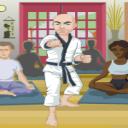Yahoo Answers is shutting down on May 4th, 2021 (Eastern Time) and beginning April 20th, 2021 (Eastern Time) the Yahoo Answers website will be in read-only mode. There will be no changes to other Yahoo properties or services, or your Yahoo account. You can find more information about the Yahoo Answers shutdown and how to download your data on this help page.
Trending News
When do you think it is time to make a first strike rather than wait for the attack?
Do you think distance is the most important criteria?
Wow. so many well though tout answers. Many good answers.
I only mentioned distance because you can't let a potential attacker get to close. That can hinder your preemptive or counter attack. It is going to be hard to decide best answer. Please vote.
Thishas been the best responce to any question I have asked in the quality and well thought out answers. So far no stupid answers. Almost enough material to write a short esay.
spl bad.
21 Answers
- ShamanLv 71 decade agoFavorite Answer
Situation dependent.... I wouldn't think distance is the most important though.
I would say being good at "listening" is more key to this. Being good at reading nonverbal cues (body language). There is a line that anyone who really wants to fight must cross. (This goes for individual and group dynamics.) Someone who is good at reading ppl and body language will be able to tune into when someone is approaching or has crossed that psychological line. Such knowledge goes beyond just spacial awareness.
There is a process a person goes through in working themselves up to attacking someone and a certain demeanor they have when they've made that decision to attack. As Bruce Lee offered in his philosophy of Jeet Kune Do.... It's a matter of "intercepting" an attacker's intentions. Morihei Ueshiba was described as having a strong talent in this regard.
Being able to sense that a person is at that line, offers an awareness of when a preemptive strike (or just another kind of preemptive action) is appropriate and required.
(It also give you some legal recourse after the altercation is over, since you can say you genuinely believed your safety was in danger.)
- 1 decade ago
As many have said, this is a many layered question, but I guess I'll start with a street encounter example. When a person has a problem with me I usually immediately attempt to leave the area saying something like, "whatever man you're not worth my time," or "I don't need to have this conversation with you." Their reaction to either let me go and heckle me or to prevent me from leaving is a red light/green light for me. If he attempts to stop me in anyway I strike. If it's a situation in which I cannot leave then I usually wait for a physical cue of some sort while trying to reason my way out of the situation, there are only a few I look for: reaching into coat or pants (seemingly to get a weapon), keeping themselves within my personal space despite my retreating movements (distance), any physical contact (poke, shove), or the "wild eye," which is this kind of angry look that usually precedes an enraged attack. The last situation is a mugging or criminally charged situation, in this instance the second I realize the type of situation I'm in I unleash all that I have at the person until he is incapacitated or an opportunity to escape appears.
For sparring it is much more complicated, and I tend to be more agressive when I spar. When I am facing off with my opponent I tend to take the tai chi approach, which is to move slowly and smoothly until I get into a planned position and then explode into an attack. This usually completely surprises my opponent and their reaction is often either too fast or too slow to stop my attack. Another instance is when my opponent projects too much; then I move in quick and attack before they complete their maneuver. Lastly, sometimes I go a little kamekaze and just attack without plan or projocation in a match, mostly to judge the opponent's reaction, but often enough I get lucky get some points as well.
To summarize my answer I would say that the most important criteria is a physical motion that indicates hostility or weakness. Facial expressions and looks can be misinterpreted, and distance can either be covered quickly or leave one at a disadvantage (if the enemy has a gun).
Source(s): 16 yrs training in martial arts 2 yrs teaching them - Anonymous1 decade ago
Wow good question. While I think that distance does play some roll I do not think it is the most important thing. When somebody "gets in my face" I just try to adjust my range by moving backward, and not being aggresive, although for some reason unlike many on here i do not have much of a problem with people doing this to me on a regular basis.
For me the most critical factor is their attitude, and their body language. If they are talking a lot of trash my anticipation of an actual self defense situation is minimized, because if they were looking to attack there would not be too many words exchanged. I mean I definetly don't drop my guard but all they are doing is pumping themselves up, so I let them. The time to strike is at the first sign of an offensive motion. this can even include their hand balling into a fist. I see this and I have already struck. It is very hard to describe in words what I look for. In this situation I might also say something along the lines of "dude before you beat me up I need to let you know that I have HIV". I think this would make any sane person question whether they want to draw blood or not.
Quite honestly in a situation where you are truly in danger and it has to get physical, you probably will not see the first one coming, or have any warning at least. If they start talking be ready, but let them build themselves up, rather than you tearing them down.
Edit: What Shaman said is where I was trying to go. rather than distance I rely more on body language and attitude to tell me if I need to strike. This is for self defense, which is what I assumed the question was about.
- YahooLv 61 decade ago
1. When an intruder has entered your home.
2. When your exit path is being blocked.
3. When a strike would impend the attacker from brandishing a weapon.
4. When the assailant is attacking an unwilling combatant or innocent bystander.
Good question. There are a lot of different scenarios which is why I accept that sometimes the safest move is the first move. However, unless a person is working in a violent environment these occasions are very few and far between, or have been in my experience.
I don't see the distance factor unless your exit is being blocked. If someone has placed your back against the wall then you are under attack.
- How do you think about the answers? You can sign in to vote the answer.
- jamesf24Lv 61 decade ago
In a real situation: When a life or lives are on the line and you feel that the odds of a peaceful solution are low. Or when you see an opening that may not present itself again and that opening gives you a high probability of ending the conflict.
In sparring or competition: It depends on your own strengths and weaknesses.
We have a guy that is an awesome counter kick specialist. He is never aggressive, but is very fast and has good timing so he scores on counter kicks. So if you train for that, then you shouldnt make the first strike.
That being said, if you are down in points and time is running out, then you have to attack.
Opening the match, if your opponent is significantly taller than you, then you need to close the distance by attacking. But first you need to go "fishing" using feints to see what his reaction is like before you walk into something blindly.
Also, if "aggression" and "ring control" are part of the judging criteria, then you need to demonstrate that to the judges.
James
Source(s): 22 Years of Martial Arts & Fitness Experience. Kenpo Karate, Goju Karate, Kung Fu, Tae Kwon Do & Hapkido. Recently began training in Jiu-Jitsu/Pancrase (Ground Fighting) US Army Veteran. Traveled to Korea and Japan. Big UFC and MMA fan. I am also a Jedi Knight. :o) Big USA / MLS /EPL soccer fan. - The Sanda PandaLv 41 decade ago
Are we talking about sparring/competition or in real encounters?
For real life encounters, I believe that you have to decide whether or not a fight is imminent. If you know that the other person is going to lay hands on you, or if you've decided that you intend to do that to him, attack as soon as possible. In that case, distance is the most important criteria. Once he's in arms reach, suckerpunching (from either side) will be hard to defend against. I might as well get mine in first.
In a sparring match, I think that there are more factors to consider. Distance is one of them. But I also consider the other person's patterns, in terms of footwork and responses to feints. I also like to remain mindful of who's got the initiative.
The feeling out process will tell me what I need to know about that stuff, at which point, it's a fight for the initiative and choosing a good time to follow up on it.
However, if my opponent is taller than me (which is everyone, since I'm only 5'5), I prefer to let them attack first. When they do, I try to evade or defend while closing the distance. From there, I work a combination and then get back out.
I find that I absorb less damage when I meet taller opponents coming in. While, if I try to chase them, those with good footwork will pepper me with straight punches while keeping me at a distance.
- 1 decade ago
I think distance is probably the first thing for a couple of reasons but the most important is debatable. You can't start your attack or combinations from twelve feet away as it gives them to much time to react but you can't wait until after you are in their range very much or very long and then expect to get started-especially if they are aggressive and moving forward. Also your ability to act and react and the speed with which you can becomes very important in this and I would not be surprised if some thought that as the most important criteria especially if they are bigger and stronger but slightly slower than just an average size guy like me.
- peter gunnLv 71 decade ago
my aikido background of course would suggest to always try to do the latter. But there's nothing wrong with beating some one to the punch. awaiting the attack opens up a whole range of possibilities for blocking and counterstriking or using the opponents initiative. but a good pre emptive strike can usually get the opponent off guard and usually has the psychological advantage of surprise. I've gotten a few sneaky strikes from underneath in like that myself and if the opponent realy does not see the strike coming it causes a fright reaction (you seem to be a ghost) a frightened opponent is not as on edge as an agressive one so you'd get the advantage there. I guess it all depends on your timing as how to react. If early strike first, if too late avoid as our creator Morihei Uyeshiba once said aikido is irimi (straight forward attack) and tenkan (round evasive moves)
- Anonymous1 decade ago
I think timing is the most important criteria. No matter how close or far you are from your enemy, anything you do can be countered or cast aside if the timing is off. At the very least, you can take a hit becuase of it - at the worst, someone else will suffer for your poor timing.
As far as when it's appropriate to make the first strike, the answer to me is when your enemy has made their intentions clear and is at a point where they are no longer safe to be around, when they are putting you or someone else in danger, or are beyond doubt of being a viable threat to one's life.
Source(s): Taekwondo, Kenjutsu (Battojutsu), Mixed Taijutsu, Kuusho Kobushi Ryu. - jwbulldogsLv 71 decade ago
Again this is a good question. There are several that I can thin of right now. I'm sure there might be more if provoked. Distance would be a very important criteria. If one of my loved ones was in danger or perceived danger. If I notice a weapon I would probably strike before it can be used. Also, like Katana said at the first sign of aggression.
Source(s): Martial Arts since 1982. Black Belt in Shorin Ryu Black Belt in Jujitsu Brown Belt in Judo






